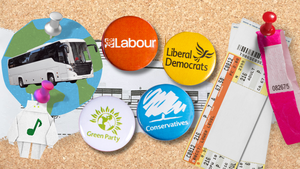As the UK General Election looms, most political parties have now published manifestos setting out their respective priorities and agendas, and what they'd like to get done should they form the next UK government. Most make some big but pretty vague statements about how important culture and music is, socially and economically, before offering a small number of more specific commitments around things like ticket touting, post-Brexit touring and AI.
Given that everyone assumes it is the Labour Party that will form the next government, perhaps most important is its pledge that, once in power, “arts and music will no longer be the preserve of a privileged few”. Culture, it adds, “is an essential part of supporting children and young people to develop creativity and find their voice”. And not only that, “there is huge potential for growth in the creative industries that benefit every corner of the UK”.
Very few voters actually read the manifestos political parties publish during elections, so it is debatable what impact they have on how people vote.
However, the manifesto of whichever party wins the election has some importance once that party starts implementing its policies. It is generally harder for MPs and members of the House Of Lords in Parliament - and lobbying groups outside of Parliament - to campaign against changes to the law that are required to meet a manifesto commitment.
In terms of trying to use the manifesto to predict what changes a future government will actually make, that depends on how specific the commitments are. Promising that “arts and music will no longer be the preserve of a privileged few” is a bold statement that will appeal to the cultural community, although it doesn't really say much.
When it comes to the specifics, the manifesto mainly points to the Labour Party’s previously published ‘creative industries sector plan’, which, it says, is about “creating good jobs and accelerating growth in film, music, gaming and other creative sectors”.
There are some more distinct commitments in the actual manifesto though. In particular, the party’s commitment to more tightly regulate ticket resale gets a specific mention.
“Access to music, drama and sport has become difficult and expensive because of ticket touting”, it declares. “Labour will put fans back at the heart of events by introducing new consumer protections on ticket resales”. Although it doesn’t say so in the manifesto, Labour previously said that would include a 10% price cap on touted tickets.
Suggesting that music education will get more support too, it states, “we will also launch a new National Music Education Network – a one-stop shop with information on courses and classes for parents, teachers and children”.
What about everyone else? The Liberal Democrats and Greens both make commitments on another issue of concern for the music industry, the impact of Brexit on UK artists touring Europe, who - since the UK left the EU - have had to navigate new bureaucracy around visas and permits.
The Lib Dems say they would “negotiate free and simple short-term travel arrangements for UK artists to perform in the EU and European artists to perform in the UK”, while the Greens say they would “ensure that musicians have access to visa-free travel to the EU through negotiating a reciprocal arrangement at the earliest possible opportunity”.
The Lib Dems also talk about the importance of music and other arts subjects in schools, which have generally been de-prioritised under the current Conservative government, and they also want to tighten up regulation on ticket touting. The Greens also run with another frequent demand from the music community - reduced VAT on tickets - though they go one step further, proposing to exempt cultural events from VAT entirely.
The Conservatives big up their commitment to apprenticeships in the creative industries, promise a review into the night-time economy of England, and say they would extend the Community Ownership Fund they launched in 2021 to “support community groups to take ownership of assets which are at risk of being lost to the community”, including music venues.
They also make some vague commitments about ensuring “creators are properly protected and remunerated for their work” in the context of AI, despite having failed to get any agreement between the creative industries and AI companies on what those protections might be.
From a music community perspective, The Greens are probably strongest on AI. “We would insist on the protection of the intellectual property of artists, writers, musicians and other creators”, they say, adding, “we would ensure that AI does not erode the value of human creativity”.
Of course, it’s easier for the smaller parties to make bold commitments in their manifestos, as they know they will never form a government and have to make good on their promises (unless it’s one of those rare UK elections where the outcome is a coalition government involving multiple parties).
Talking of the smaller parties - although a smaller party that would probably want you to know they are currently close to the Conservatives in the polls - what about the right wing pro-Brexit Reform Party?
Well, when you search “culture” in its manifesto, you get big statements on British culture, cancel culture and agriculture. British culture must be protected, cancel culture must be stopped and, as for agriculture, they want the kids to be encouraged to work on the farms. Though not wind farms and solar farms. They really don't like wind farms and solar farms.

